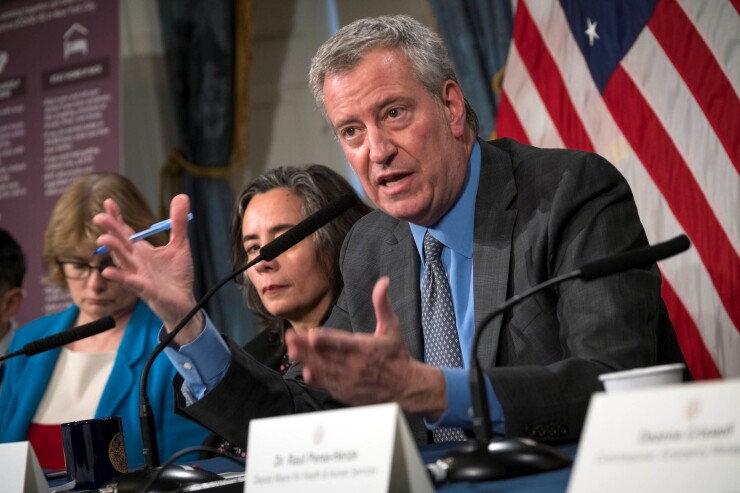How severe a financial hit New York City will take during the COVID-19 pandemic is as much of an unknown as the degree of virus spread.
"I don't think for most of us, even who have been in public life a long time, we've seen a situation quite like this where we receive extraordinary new information on what now literally feels like an hourly basis," Mayor Bill de Blasio told reporters Thursday while declaring a state of emergency. "The last 24 hours have been very, very sobering."

Plummeting markets — with Thursday's Dow Jones plunge the worst since "Black Monday" in October 1987 — and a shutdown of entertainment facilities, such as Broadway, and other businesses figure to sock the city's revenue streams.
De Blasio said the financial support needed for New Yorkers and affected businesses will require the state "and even more so, the federal government" to provide that help, the mayor said. "We're going to urge them to do that."
City Council Speaker Corey Johnson, meanwhile, said the council is looking at creating a fund to help people and businesses affected. That includes theaters, concert venues, movie theaters, gyms, sports arenas, not-for-profits and other public-gathering places.
"The city must take actions to give them relief," Johnson said.
The crisis has also revived the question of whether the city has enough reserves to withstand a downfall. Roughly $6 billion of reserves consists of set-asides for emergencies or revenue shortfalls. Voters in November approved the establishment of a rainy day fund, which the capital markets perceive as credit solidifiers, but it remains unfinished business.
"We do have workarounds in the city and we do have rainy day funds in the state, but the key is they're not effective unless you use them," said Andrew Rein, president of the watchdog Citizens Budget Commission. "The city and state need to be fiscally stable themselves, or they won't have the ability to protect New Yorkers or New York businesses."
According to Bank of America Securities, an issuer's pre-virus credit will likely dictate credit impact, as it does with natural disasters. "Strong liquidity and reserves, the ability to borrow for cash-flow purposes, strong and proactive management teams and financial and fiscal practices are crucial," BofA Securities said Friday.
"We prefer issuers with stronger debt and financial metrics and also debt higher in the capital structure. In times such as these, be selective," they said.
Moody’s Investors Service upgraded New York’s general obligation bond rating to Aa1 from Aa2 last March 1. S&P Global Ratings and Fitch Ratings both rate the city's GOs AA. All three assign stable outlooks.
The city holds $38 billion of general obligation debt, according to city Comptroller Scott Stringer's office.
Meanwhile, New York slowing to a crawl has affected ridership — and revenue — of the state-run Metropolitan Transportation Authority, which operates the city's subways and buses, Long Island and Metro-North commuter railroads and several intraborough bridges and tunnels.
De Blasio and Gov. Andrew Cuomo have urged New Yorkers to work from home wherever possible and avoid crowded subway trains.
Subway ridership was down about 18% on Wednesday.
"Having said that, we carried four million people safely," MTA Chairman Patrick Foye said Friday on Fox 5's "Good Morning New York." "The subway system, the bus system, the commuter rails are safe. We have increased, substantially, the frequency and intensity of disinfecting the stations."
Cuomo, who controls the MTA, insisted that for now, the subways wouldn't close.
"No, subways are not closing down, roads are not closing, New York City is not closing down," he said. "First of all, no city in the state can legally close down unless the state lets it close down, the state government.”
Without city, state or federal subsidies or a temporary or permanent reliable funding source, New York’s Metropolitan Transportation Authority will realize a wider budget gap in 2020 than its February financial plan projects because of COVID-19, Kroll Bond Rating Agency said.
According to Kroll, the continuing virus fear could eat into the favorable budget forecasts MTA officials described in their February financial plan. For now, the authority plans to absorb such costs into its $14.7 billion budget, net of debt service, but is also exploring contingencies.
Delays in the launch of a congestion-pricing mechanism for Manhattan, which could raise up to $15 billion in mass transit through bonding, could also jeopardize the MTA's bottom line.
Still, Kroll sees a silver lining.
"KBRA believes that the current stressful environment may finally force lawmakers to address the inevitable need for permanent new funding sources for the MTA’s operations,” it said in a commentary on Thursday. “Other large, vibrant metropolitan areas such as Dallas, Houston, and Los Angeles have addressed this need some time ago.”
Moody's has said that any credit effect for the MTA will hinge on the depth and duration of any economic and service disruption. According to Moody's, strong management, diverse revenue composition and a 1% budget reserve enhances the authority's resilience to service disruptions.
New York State Comptroller Thomas DiNapoli
"The debt burden could grow even higher, depending on the timing of bonds to be issued by the MTA to fund its share of the 2020-2024 capital program," DiNapoli said in a report.





